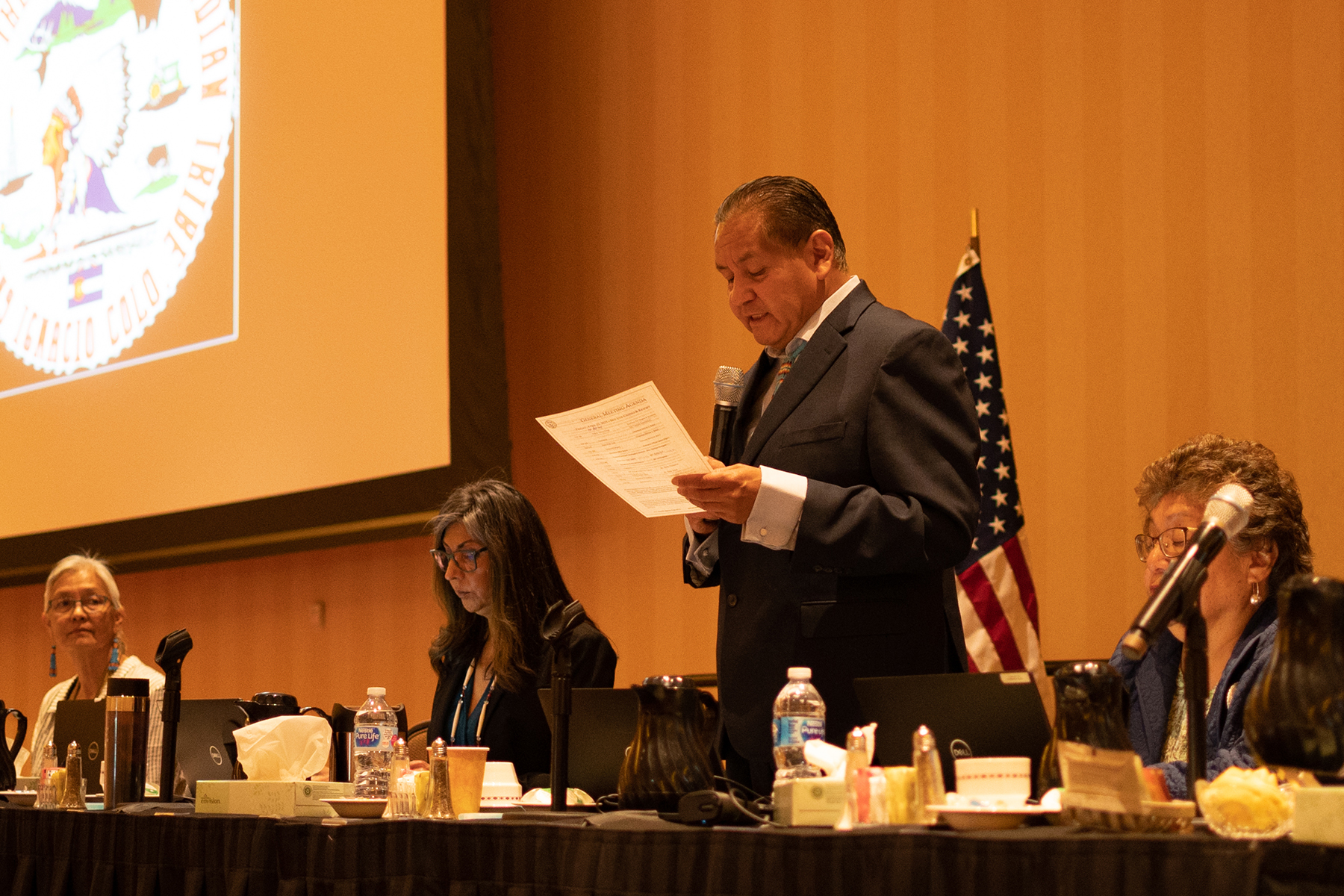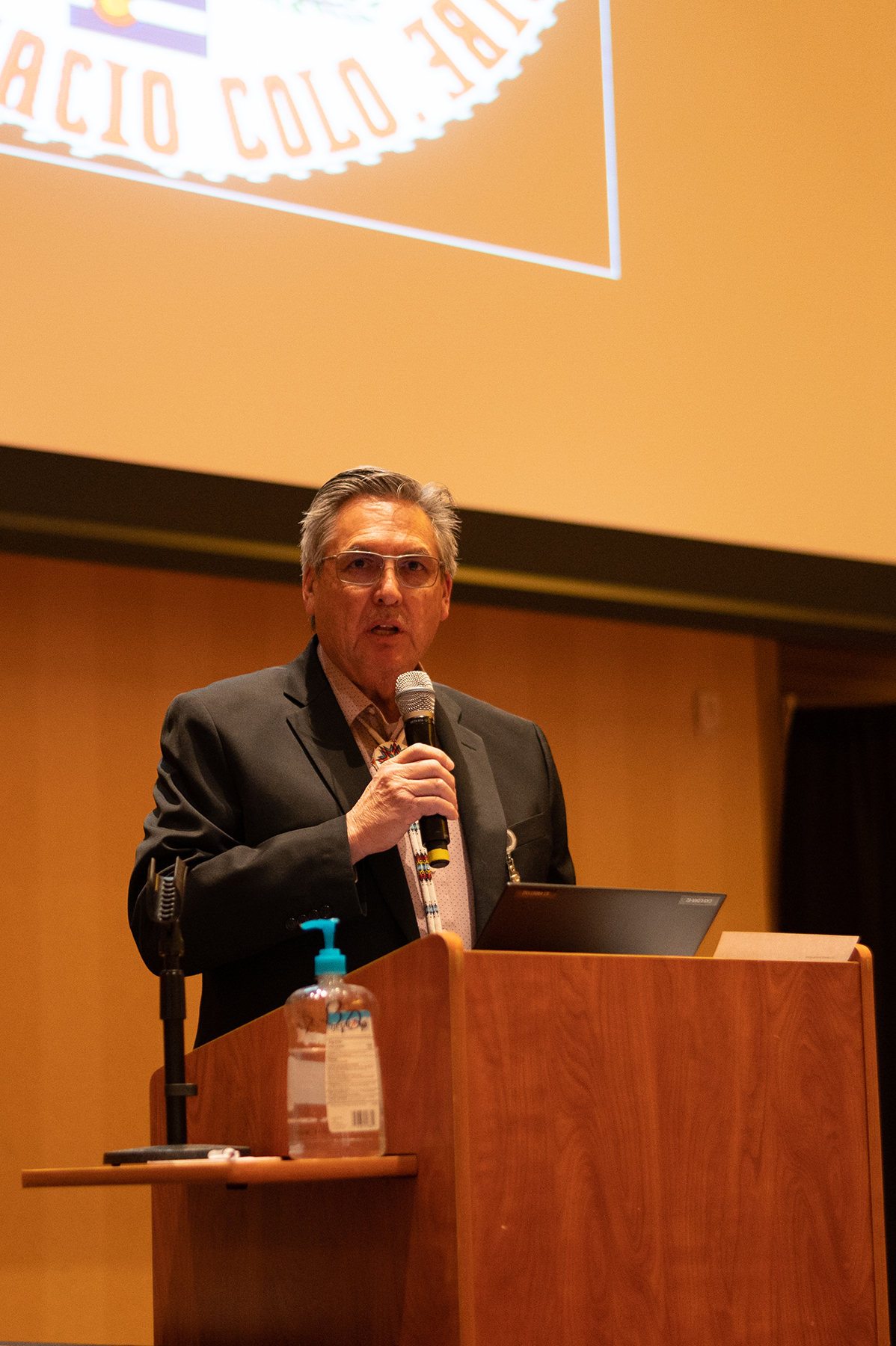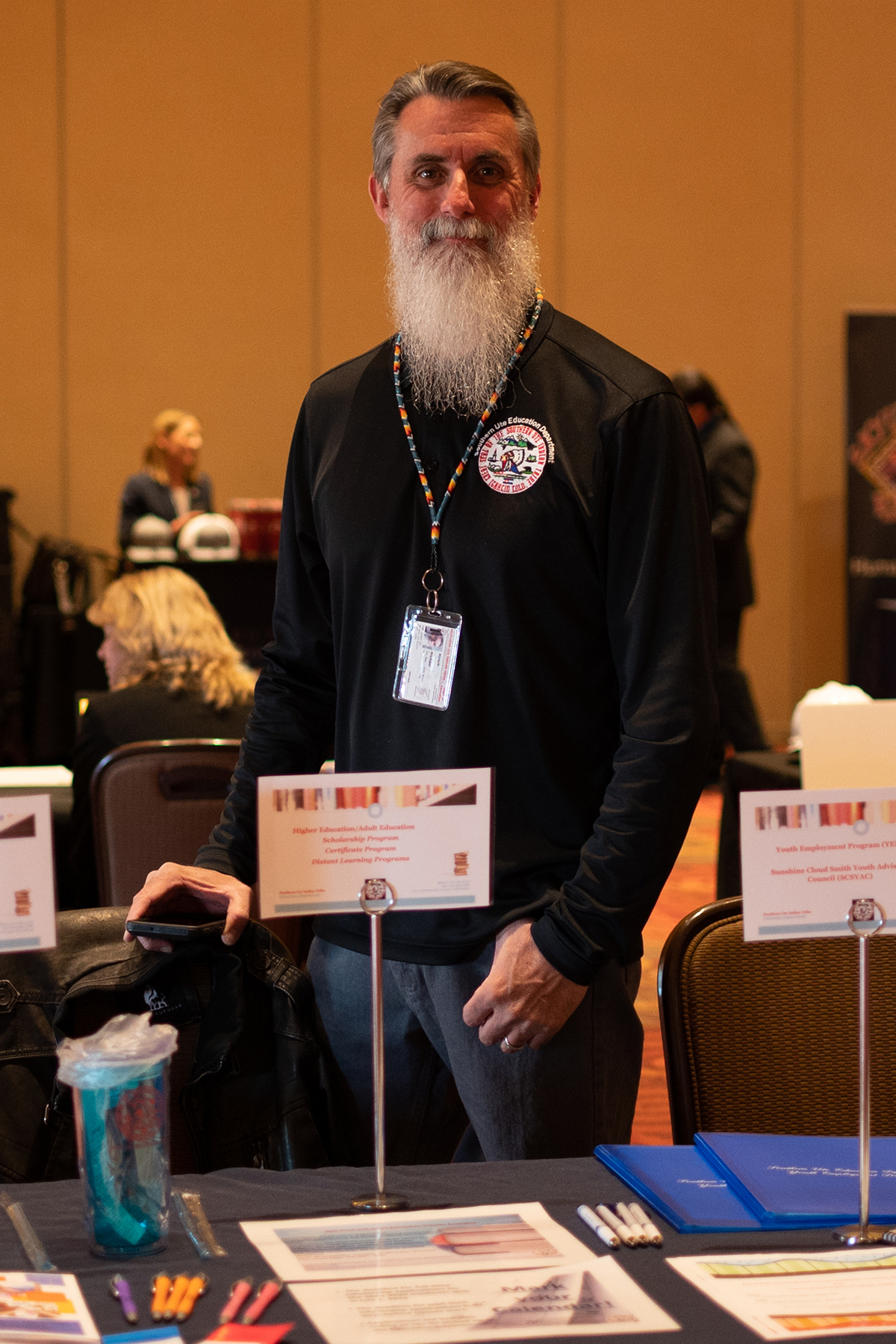General Meeting held in-person at Casino
The Southern Ute tribal membership joined the Southern Ute Tribal Council, the Southern Ute Growth Fund and other Permanent Fund departments for the General Meeting on Friday, April 23, at the Sky Ute Casino Event Center. This is the second time a General Meeting has been held since the start of the COVID-19 Pandemic, the last being in September of 2021.
While most COVID-19 restrictions have been lifted since lower infection rates have contributed to lower trends, the Southern Ute Indian Tribe has continued its vigilant approach against COVID-19 infections to ensure the safety of the membership. For safety, the meeting required temperature checks upon entry to attend, while also encouraging the use of masks.
“We are excited to return to some normalcy,” Southern Ute Chairman Melvin J. Baker said. “We still encourage tribal members to follow safe health practices to protect our tribal community.”
The meeting was also available for attendance via WebEx for individuals who preferred to maintain social distancing practices or live off the reservation. The result being a continuation of an in-person and digital, hybrid experience, similar to the 2021 General Meeting.
No matter how the membership attended, the General Meeting allowed for tribal members to learn about the state of the Tribe from the executive level down to individual departments, while also getting the opportunity to ask questions. The main topics discussed ranged from the overarching state of the Tribe to the annual Treasurer’s Report. The meeting also included an update from Water Resources, project highlights from Southern Ute Shared Services, a special update from the Culture Department’s “Hundredth Year of Tribal Fair” celebration, closing out the day with updates from the Southern Ute Growth Fund.
The State of the Tribe Address
Chairman Baker began the General Meeting with the “State of the Tribe” and Chairman’s Report to help detail the overall condition of the Southern Ute Tribe as well as introduce the topics of discussion for the meeting.
Effective Tuesday, March 1, the Southern Ute Tribe has rescinded all COVID-19 restrictions allowing tribal employees back into the workplace and visits from the tribal membership and public as business allows.
Since the last General Meeting in late 2021, the Southern Ute Tribe and Tribal Council have continued to work on projects within the fluctuation of the Pandemic. One of many being a general reevaluation of the Tribal Code. This evaluation will help determine which parts of the Tribal Code need to be updated. Currently, the Tribal Council is working to evaluate the “Truancy Code,” which is aimed at kids in school and helping them complete their education.
The Southern Ute Tribal Council has also continued work at the state and federal level to procure assistance and funding for projects, while continuing to be involved in legislation.
“Understanding what is going on at the federal level and how it impacts the Tribe, and the membership is vital,” explained Chairman Baker. “This year there has been quite a bit of bills signed by Governor Polis and the state of Colorado that do have impacts to the Tribe and that’s a first. We are really seeing things moving.” Chairman Baker continued to explain the possibility of the introduction of a lobbyist position that would work directly with the Southern Ute Tribe and the State of Colorado to help push legislation and bills that supports the Southern Ute Tribe and Indigenous people that are residents in the state.
One bill that moved forward with the involvement of the Southern Ute Tribe was the Prohibit American Indian Mascots Act (SB21-116). This act was signed in 2021 and removes potentially harmful stereotypical logos and names from schools across the state. The act is starting to take effect in some districts, as schools are actively changing their team names and mascots; there are several schools in Colorado that are continuing to hold out on changing their names and are being financially penalized as a result.
Tribal Council continues their work on various panels and committees at the local and state level dealing with prominent issues such as Missing and Murdered Indigenous Women (MMIW) and Tribal Water Rights, among others, to further secure a seat at the table for tribes and Indigenous people.
Water Resources Update
One of the biggest topics of discussion at the General Meeting was the use and management of water on the Southern Ute Reservation. The Water Resources Division Head, Kathy Rall gave an update to the membership on the current state of water management and rights.
“As you know water is very much a big deal, nowadays,” Rall stated. “Our water Resource mission statement is to make sure that we take care of the Tribe’s water as best we can for the future and for current membership.”
Following this mission, the Southern Ute Water Resource division is responsible for management to protect water rights, develop water access, provide technical support, represent the Tribe in water rights negotiation, monitor water resumés – or legal notices, and apply for grants as needed. “So that includes conservation and making sure we use the resources in the Tribe’s best interest,” Rall explained.
The Southern Ute Reservation is located in a region called the Upper Colorado Basin and receives most of its water from the seven rivers that flow through tribal lands as well as Vallecito and Lemon Reservoirs. The Tribe has established water rights due partly to an 1868 agreement from when the Southern Ute Reservation was established and holds some of the oldest water rights in the region. Due to this agreement, the federal government is dedicated to ensuring that the Tribe receives its water.
This compact was signed in 1922 without the input of Tribes in the area and features seven states in total with four – including Colorado – in the upper basin and three in the lower basin. Water has been released out of Lake Powell with the authorization of the Colorado River Compact to help ease the effects of the yearly droughts in the Lower Colorado Basin, which is causing concern amongst Tribes in the area.
According to Rall, the Colorado River Basin in its entirety has been in a drought since 2007. “They developed this water right specifically with no tribal involvement and the Tribes have rights to over 25% of the Colorado River,” Rall said.
To ensure tribes are receiving their water rights, the Southern Ute Tribe, among many others are working with state and the federal government to renegotiate the Colorado River Compact to include and allocate for tribes in the region to receive their water. The Colorado River Compact expires on December 31, 2025, and a new negotiation is being spearheaded by Southern Ute Tribal Council member Lorelei Cloud, representing the Southern Ute Indian Tribe.
Southern Ute Shared Services Update
Southern Ute Shared Services (SUSS) has been busy working on a variety of projects including a cyber security campaign, the Tribal Member Digital Equity Program (SUDEP) and the Tribal Member Experience portal. The major update that was given to the membership was a progress report on the Broadband Modernization Project.
As of Friday, April 23, Southern Ute Shared Services, and contractors are still currently working on Phase I of the Broadband Modernization Project — out of three initially proposed phases. In this initial phase, SUSS is employing the FCC 2.5 GHz license as well as 52 miles of fiber optic cable, which is being installed near State Highways and County Roads on the reservation. County Road 318 West and Highway 516 currently have teams installing cables using a variety of equipment, including bore machines, adding a number of new structures to help with connectivity.
“We are constructing two new towers,” Southern Ute Shared Service Chief Information Officer, Jeff Engman explained. “We are using four existing towers…in order to push broadband signal to the highest density populations within the reservation.”
Between now and September of 2022, workers will continue to work on installing fiber optic cables, securing funding from the state, working on business planning operations, while also planning engineering aspects for Phase II.
Another big project that SUSS is currently undertaking is the Tribal Member Digital Equity Program . With this program, SUSS and the Southern Ute Tribe want to improve access to technology for tribal elders and any members who might not know how to use computers. The project will also help provide tools that can help tribal members connect to tribal services like the new Tribal Member Experience website, essential services, school programs, and remote work. 75 computers will be immediately distributed to the membership, with priority for elders, with plans to release as many as 1,000 computers after five years.






